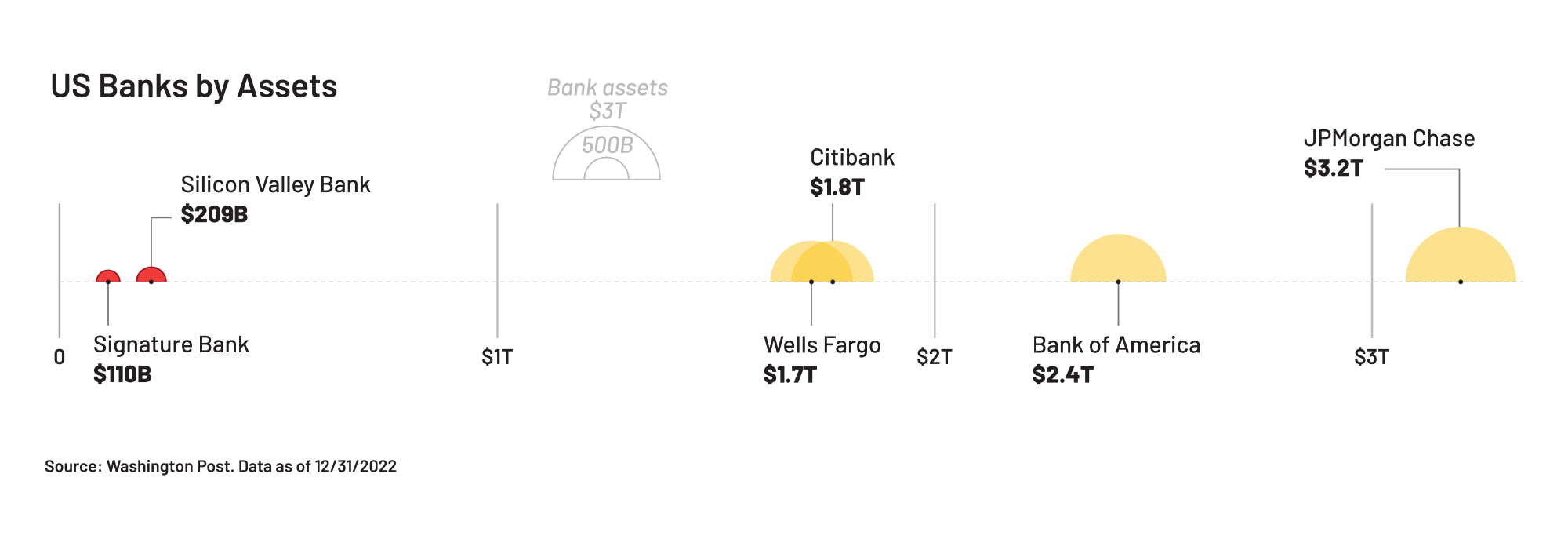
Bank Contagion & the SVB Collapse - Should We Be Worried?
With the markets reacting this week to the recent collapse of Silicon Valley Bank and others, many investors may be wondering:
Is it 2008 all over again? Should we be worried about the financial system collapsing?
In this post, we'll break down some of the recent events and discuss potential impacts on the financial markets.
On March 10th, Silicon Valley Bank (SVB), a bank catering to startups closed its doors after it could no longer cover withdrawals.1
Days later, regulators also took over Signature Bank.
There's reason to believe a number of other banks may be in trouble.2 Rising interest rates are hitting many banking portfolios hard and weaknesses are emerging.
Should we be panicked about these bank failures?
We say no, and here's why:
The affected banks are small in the context of the overall banking system.

You can see in the chart above how small these two failed banks are relative to other, larger financial institutions.3
They also serve high-risk niches. These banks have a lot of exposure to cryptocurrencies, startups, and other highly volatile asset classes.4
Those risky assets can make them more vulnerable to bank runs and liquidity issues. Which is what we're seeing happen.
Will more banks collapse?
That’s very possible. Moody’s, a rating agency, reported that it’s watching several other institutions with potential problems.2
Some larger banks may be affected as well, but it looks like regulators are stepping in quickly to protect the overall financial system.
What can we take away from the SVB failure?
Now is a good time for one of Warren Buffett's famous bits of wisdom:
"Only when the tide goes out do you discover who's been swimming naked."
What he means is that adverse conditions expose vulnerabilities and risky choices.
Many strategies can look brilliant when markets are booming. You don't always know or appreciate the risks until conditions turn against you.
Clearly, a number of institutions are finding that out.
There's a lesson here for us as individuals as well:
When times are good, we might not worry too much about our income or our expenses. Or the risks we take in the market.
But when times get tough, we start appreciating the risks we've taken and the obligations we've taken on.
Understanding our actual tolerance for risk and our ability to withstand rocky times is absolutely critical.
It's very hard to do when the sun is shining and life is good. But it's a skill well worth developing because we can expect to experience bear markets, recessions, and uncertain conditions throughout our lives.
Markets are reacting with volatility (as they usually do) to the uncertainty and it's possible we could see some new lows.
This is why we work closely with all of our clients to help them prepare for both good markets and bad. Having a solid plan in place when the unexpected happens can help you sleep well at night, without worrying about hiccups in the market and how they may impact your financial future.
If you have any friends or family who are very worried or about to make some financial moves because of the headlines, feel free to share this post with them and encourage them to reach out to us. These are the times when an objective, professional take can help people understand their options and make better decisions.
Contact our office if you would like to schedule a time to discuss your plan with a financial professional.
Sources:
- https://www.cnn.com/2023/03/13/investing/silicon-valley-bank-collapse-explained/index.html
- https://www.cnbc.com/2023/03/14/moodys-cuts-outlook-on-us-banking-system-to-negative-citing-rapidly-deteriorating-operating-environment.html
- https://www.washingtonpost.com/business/2023/03/13/bank-failure-size-svb-signature/
- https://www.cnbc.com/2023/03/12/regulators-close-new-yorks-signature-bank-citing-systemic-risk.html
Chart source: https://www.washingtonpost.com/business/2023/03/13/bank-failure-size-svb-signature/
Disclosure:
Investing involves risk including the potential loss of principal. No investment strategy can guarantee a profit or protect against loss in periods of declining values. Past performance does not guarantee future results.
This material is for information purposes only and is not intended as an offer or solicitation with respect to the purchase or sale of any security. The content is developed from sources believed to be providing accurate information; no warranty, expressed or implied, is made regarding accuracy, adequacy, completeness, legality, reliability, or usefulness of any information. Consult your financial professional before making any investment decision. For illustrative use only.
